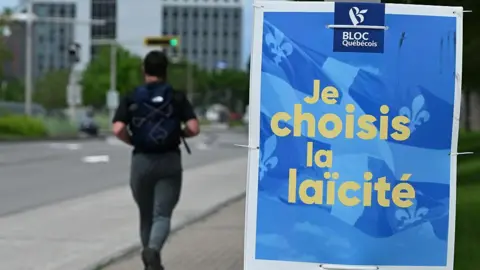 Bloomberg via Getty Images
Bloomberg via Getty ImagesThe Canadian province of Quebec plans to impose restrictions on public prayers and limit the exclusive offering of religious menus, such as kosher and halal meals, in government institutions.
The latest effort to strengthen state secularism, dubbed “secularism 2.0,” is part of a new bill introduced by the ruling Avenir Quebec (CAQ) coalition on Thursday expanding a 2019 religious symbols law that has sparked fierce debate across the country.
The original law prohibits judges, police officers, teachers and government employees from wearing symbols such as a kippah, turban or hijab on the job.
The Supreme Court of Canada will hear a legal challenge to the law early next year.
Jean-François Roberge, the minister responsible for secularism, told a French-language news conference on Thursday that the bill was “part of an approach that respects both individual and collective rights.”
The measures proposed in Bill 9 will be:
- Expand the ban on wearing religious symbols to staff at subsidized kindergartens
- ban “collective religious practices” such as prayer in public places such as parks without prior permission from municipalities
- prevent students and staff from wearing face coverings in daycare centers and higher education institutions
Roberge said the restrictions on public prayer were a reaction to recent protests in the province, where there had been debate over groups praying at pro-Palestinian demonstrations.
“It's shocking to see people blocking traffic, taking over public spaces without permission or warning, and then turning our streets, our parks, our public squares into places of worship,” he said.
The decision to tighten the law has already been criticized by the opposition Parti Québécois, which earlier this week accused the CAQ of creating a rift in an attempt to win support ahead of next year's provincial elections.
The National Council of Canadian Muslims also criticized the bill, accusing the CAQ of “doubling down on identity politics and division in a desperate attempt to regain public trust.”
Since Bill 21 was passed six years ago, the problem of secularism in Quebec has continued to escalate.
Last year, 11 teachers (mostly of North African descent) at a Montreal elementary school were suspended after a government report said they created a toxic environment for students and staff and largely avoided certain subjects such as science and sex education.
Quebec Premier Francois Legault said teachers were trying to instill “Islamist” beliefs and vowed to strengthen secularism in schools.
In August government-authorized committee published a report with recommendations including a ban on the use of religious symbols for day care workers and a gradual end to government funding for private religious schools.
And last month, Legault's government passed legislation extending secularism rules to staff who interact with students in public elementary and secondary schools and prohibiting students from wearing face coverings.
 NurPhoto via Getty Images
NurPhoto via Getty ImagesWhat is Quebec's secularism law?
Bill 21 prohibits public officials in positions of authority, such as judges, police officers, teachers and civil servants, from wearing religious symbols such as a kippah, turban or hijab at work.
It also requires that public services be given and received with an open face.
In Bill 21, the Quebec government used the “notwithstanding clause,” a part of the Canadian constitution that allows the government to ignore the “fundamental freedoms” of religion, expression and association, as well as the rights to life, liberty and security of the person, and freedom from discrimination.
Essentially, it serves as an opt-out that prevents courts from striking down legislation on constitutional grounds.
Bill 21 does not mention any specific religion and will include symbols worn by people of all faiths, including Christians, and affirms the religious neutrality of the province.
But critics say it mainly targets religious minorities, especially Muslim women.
The law has faced a number of legal challenges in Quebec. The Supreme Court of Canada has now agreed to hear the case, which will depend both on the law itself and on the use of the escape clause.
The debate over secularism—generally the principle that religion and government institutions should be kept separate—has played a significant role in the province's public discourse for nearly two decades.
Known in most French-speaking provinces as laïcité, it has become an important value in Quebec society since the 1960s, when the strong influence of the Catholic Church in the province began to wane.
A September poll conducted by polling firm Leger and commissioned by the media outlets Le Journal de Montréal and TVA found that 68% of respondents considered secularism an important value.
Legislation similar to Bill 21 is in force in various EU countries.
France introduced a ban on veils, crosses and other religious symbols in schools in 2004 and on face coverings in public in 2010.









